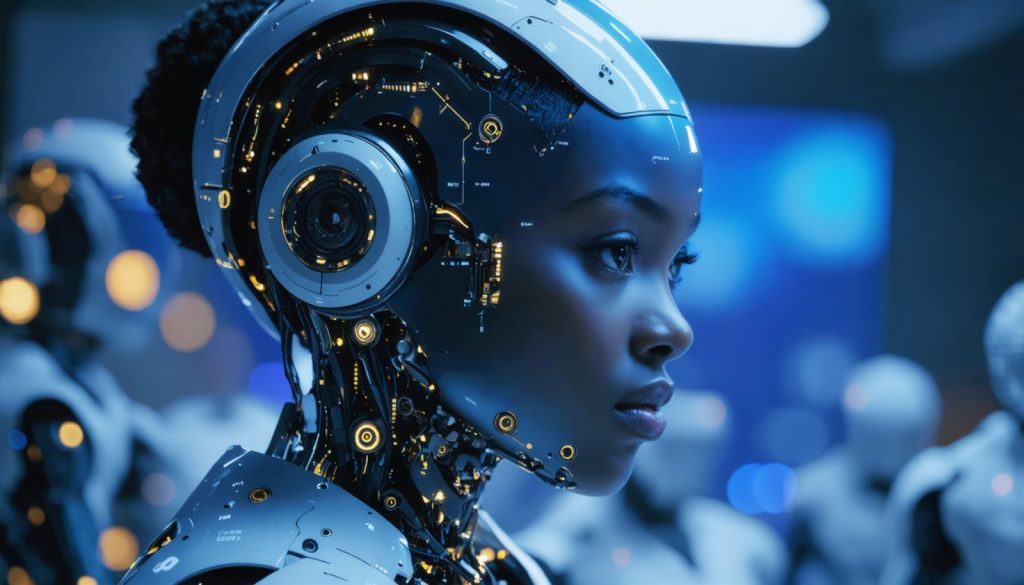
- GITEX Africa 2025 highlights Africa’s digital transformation, led by NITDA’s Director-General Mallam Kashifu Abdullahi.
- Abdullahi emphasizes the need for African leaders to embrace AI as a strategic ally.
- AI-driven leadership is proposed as a paradigm shift, encouraging a merger of human intellect and artificial reasoning.
- Inclusive data is crucial for AI, ensuring diverse representation and avoiding inequality.
- NITDA’s Regulatory Intelligence Framework aims to navigate emerging tech with innovative oversight.
- AI is seen as a tool to bridge development gaps in sectors like agriculture, health, education, and finance.
- Global leaders stress the importance of an ethically grounded and inclusive AI future for Africa’s growth.
Amid the sunlit expanse of Marrakech, a new dawn rises with promises of digital transformation at GITEX Africa 2025. At the heart of this visionary movement stands Mallam Kashifu Abdullahi, Director-General of the National Information Technology Development Agency (NITDA), urging African leaders to embrace artificial intelligence (AI) as a strategic ally.
Flanked by a tapestry of influencers—policymakers, investors, and tech enthusiasts—Abdullahi brought forth a clarion call: Africa must not lag in the rapid strides of the global AI revolution. With Nigeria poised as a nexus of innovation, he urged a fresh perspective: consider AI as an integral partner in leadership, a collaborator in the relentless pursuit of precision and speed.
The essence of his message revolved around AI-driven leadership. Abdullahi’s vision redefines traditional paradigms, integrating AI into the DNA of decision-making processes. This evolution demands a symbiotic relationship between human intellect and artificial reasoning—co-intelligence for tomorrow’s leaders.
Yet, as the promise of AI beckons with new opportunities, Abdullahi warns of pitfalls. He highlighted the quintessential role of inclusive data, ensuring representation across every cultural and societal spectrum. In a poignant reminder, he stated that failure to account for diverse datasets risks perpetuating inequalities. AI must see every community it seeks to serve.
Central to this transformative journey is NITDA’s Regulatory Intelligence Framework, an avant-garde approach combining classical rule-based oversight with dynamic, exploratory governance. This fusion aims to navigate the pliable reality of emerging technologies, equipping regulators with agility and foresight.
Envisioning a continent abuzz with innovation, Abdullahi shared his hope: AI could bridge longstanding development gaps, accelerate growth, and drive solutions in pivotal sectors—agriculture, health, education, and finance. As the fourth industrial revolution looms large, Africa stands on the cusp of not just participation, but leadership.
Echoing his sentiment, distinguished panelists like Kenya’s Special Envoy on Technology and industry leaders from Pesalink and OpenAI emphasized an ethically grounded, inclusive AI future. This collective vision seeks a vibrant, digitally empowered Africa that champions development through technological prowess.
GITEX Africa 2025 unfolds as a canvas of infinite potential, capturing the essence of a digitally advanced continent. As global conversations intensify, Abdullahi’s bold advocacy stands as a beacon, ensuring Africa’s inevitable rise in the AI age—leading, not following.
How AI Can Revolutionize Africa: Insights from GITEX Africa 2025
Introduction
At the GITEX Africa 2025 summit in Marrakech, the dialogue was clear: Africa must become a leader in the AI revolution. Mallam Kashifu Abdullahi, Director-General of Nigeria’s National Information Technology Development Agency (NITDA), emphasized the strategic importance of AI-driven leadership. With Africa’s burgeoning tech economy, the continent is poised to leverage AI for unprecedented growth.
Expanding the Conversation: What AI Means for Africa
AI in Key Sectors
1. Agriculture:
AI can optimize farming practices through precision agriculture, which employs data-driven insights to enhance crop yields and reduce waste. Technologies like drones and IoT sensors can monitor soil health and predict weather patterns, ensuring efficient resource use.
2. Healthcare:
AI-driven diagnostics can improve healthcare delivery with algorithms that predict patient outcomes, personalize treatment plans, and streamline operations. For instance, machine learning can aid in early disease detection and telemedicine can expand healthcare access in remote areas.
3. Education:
Personalized learning powered by AI can adapt educational content to meet individual students’ needs, helping bridge the educational divide. Virtual classrooms and AI tutors can provide scalable, quality education across the continent.
4. Finance:
AI can enhance financial inclusion by powering digital banks and mobile payment systems, providing underserved populations with access to financial services. Moreover, AI can detect and prevent fraud, safeguarding economic growth.
Navigating Challenges: Inclusivity and Ethics
Inclusive data practices are critical to ensuring AI benefits all communities. Abdullahi highlighted the risk of AI perpetuating biases if datasets lack diversity. Policymakers must prioritize building representative datasets to foster equitable outcomes.
Framework for Ethical AI
NITDA’s Regulatory Intelligence Framework combines traditional oversight with adaptive governance to manage AI’s dynamic landscape. This approach ensures AI development aligns with ethical standards, balancing innovation and regulation.
How-To Steps & Life Hacks
– For Policymakers: Implement guidelines to incorporate diverse datasets in AI development. Host workshops to educate stakeholders about ethical AI.
– For Tech Entrepreneurs: Collaborate with local communities to identify specific challenges AI can address, ensuring solutions are culturally relevant and sustainable.
– For Investors: Support startups that focus on AI for social good. Investing in ethical AI startups can yield both financial returns and positive societal impact.
Market Forecasts & Industry Trends
According to PwC, AI could contribute up to $15.7 trillion to the global economy by 2030, with Africa reaping significant benefits by focusing on AI in agriculture, healthcare, and finance. The integration of AI in these sectors can drive unprecedented economic growth and job creation.
Real-World Use Cases
– Senegal: Implemented AI-driven health initiatives that improved disease diagnosis and management.
– Nigeria: Leveraged AI in agriculture to advance soil management and pest control.
Pros & Cons Overview
Pros:
– Enhanced efficiency across sectors
– Increased accessibility to services
– Job creation in new tech industries
Cons:
– Potential for bias if not carefully managed
– Requires significant investment in infrastructure and education
– Regulatory challenges in fast-paced tech environment
Actionable Tips
– Governments: Formulate policies encouraging AI investment and research.
– Businesses: Integrate AI solutions to enhance productivity and customer engagement.
– Individuals: Upskill in AI-related technologies to stay relevant in the job market.
Conclusion
GITEX Africa 2025 showcased a convincing narrative of Africa’s AI potential. As Abdullahi’s vision for AI-driven leadership gains traction, stakeholders must collaborate to harness AI’s transformative power ethically and inclusively. Africa’s future in the AI era is not just to participate but to lead, heralding a vibrant, technologically-empowered continent.
For more insights, check out the official website of the GITEX Africa.



